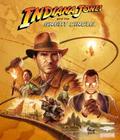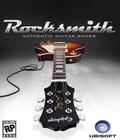Rocksmith hit the consoles some time ago, and it certainly bridged the gap between real-world musical instruments and music games. The PC version has been a long time coming, and it finally allows the remainder of the gaming population to get in on the gig. With the bass guitar DLC built in, the PC iteration can be considered just as definitive as its console-based brethren.
The game is essentially the same as it was on the consoles, assuming you also have the bass guitar DLC. The PC version of Rocksmith comes with no new features other than the ability to tweak some PC-centric settings and a slightly redesigned interface. Otherwise, all content and functionality are more or less identical to the console versions. It's not that this is a bad thing per se, but anyone who already owns a copy of the game on the console may not have a reason to pick up this version as well.
Of course, that also depends on how bad the audio lag is with your entertainment setup. Both the Xbox 360 and PlayStation 3 versions could suffer from atrocious audio latency; the fault had more to do with the specific configuration of the consoles than with the game. However, a standard PC setup only has a minimal amount of audio latency — assuming you aren't sending the signal to another device for further processing. For those currently using a console version and without a setup that allows for the proper connectivity to alleviate latency, the PC iteration may be an attractive option to consider.
Just as before, the game is often touted as a means of helping novice guitar players learn how to play, and to this end, it does not disappoint. Bundled with a proprietary adapter, the game lets you plug in just about any guitar or bass guitar and use it with the game. The game assumes that you are a complete novice — until proven otherwise — and at first, it goes over the basics of a guitar's features as well as how to tune it properly. The gameplay starts off about as easily as it can, tasking the player with strumming a note every 10 seconds or so to the Rolling Stone's "Satisfaction." How the difficulty and complexity of the song ramps up from there is entirely up to you.
Rocksmith uses a dynamic scaling difficulty system and constantly monitors your success rate in hitting notes. Do well, and the game automatically ramps up the difficulty in the middle of the song. What were single notes might become chords, and the amount of notes that you have to play increases and gets closer to the actual song as written. Start doing poorly, and after a while, the game reduces the complexity, letting you get a grasp of the song again.
Importantly, though, unlike its peers in the genre, Rocksmith doesn't consider failure. There is no rock meter, and you'll never hear the crowd attempt to boo you off the stage. The game maintains a consistent attitude toward being constructive, with the worst result being that the game temporarily lowers its difficulty. One way or the other, you always make it to the end of the song, and you almost undoubtedly learned to play the song a bit better every time. For novice players, this is absolutely essential, and the game's stance as a gentle tutor is one of its biggest strengths.
For those who know their way around the instrument, the beginning of the game can be a little slow. Whether you are playing better or worse than normal, the title takes a little while to ramp up or down to match your difficulty level. If you are already familiar with playing guitar, it can take a few songs before the difficulty reaches the desired level. However, once that balance has been achieved, it is no longer an issue.
Every song allows you to play it using either the guitar or the bass guitar, and in the case of the guitar, there can be a couple of different parts. The difficulty scale tracks each instrument separately, so if you've been plucking along with a bass guitar for a long time but just picked up a new electric guitar, the game won't automatically consider you to be skilled at it. This also means that players who have different aptitude with the two instruments will see the game adapt to them for each one.
The soundtrack spans a few decades as well as a few genres, with fairly even coverage throughout. Bands like the Black Keys, Blur, Nirvana and the Stone Temple Pilots are some examples, though there are a few more obscure entries, too. A common theme is that they all have interesting parts to play. Unlike games like Rock Band, where each song has four parts and some may not be the most fun, Rocksmith's soundtrack seems hand-picked for the enjoyment of the guitar and bass guitar parts.
There is no real "career" mode, other than a system that lets you gain points toward becoming different levels of acts. Progression is done via playing gigs comprised of a set list between three and six songs. For each gig, you first must play through each song in practice mode, essentially proving that you can play the song at least at a basic level, and then you can play the set list "for real" at the venue. The game automatically generates sample set lists for play, but you can freely add, remove and replace songs as much as you want with no penalty. If you are struggling with a song or just flat out don't like it, you can swap it out with any other song you want.
Performing a gig well has its benefits. At the end of the gig, you may be asked for an encore, which is a brand-new song that you haven't played or accessed before. Play that encore well, and you'll get another new — but much harder — encore song. Chances are you probably won't do very well in the second encore, but you unlock both songs regardless. Individual songs can also be mastered, allowing you to play the song without any on-screen prompts for guidance. At this point, it's just you and your instrument playing the song, with the added benefit that you gain twice the normal amount of points and feel like a genuine badass.
DLC support for the game has been relatively strong, with quite a few releases. A lot of them center on additional songs for bands who are already in the game, but some of the DLC music is entirely new to the on-disc catalog. These songs can be swapped out and used in the career version just like any other song, so their integration is as seamless as expected. DLC purchased for the console version does not transfer to the PC release, and vice versa.
For years, gamers playing games like Guitar Hero or Rock Band have wanted to be plug in real instruments to play, and Rocksmith solidly delivers. Guitar newbies and novice shredders will find that the game quickly adapts the difficulty to their skill levels. The PC version doesn't offer anything additional over the console version, other than perhaps less audio latency, so those who already own a copy have no reason to pick up the PC offering. However, those who don't have the game and are musically inclined would do well to pick up Rocksmith, and the PC version is arguably the most accessible version of all.
Score: 9.0/10
More articles about Rocksmith











 Rocksmith is the first and only game where players can plug any real guitar with a standard quarter-inch input jack, and play through an in-depth library of music including everything from the latest hits to classic rock songs.
Rocksmith is the first and only game where players can plug any real guitar with a standard quarter-inch input jack, and play through an in-depth library of music including everything from the latest hits to classic rock songs.



















